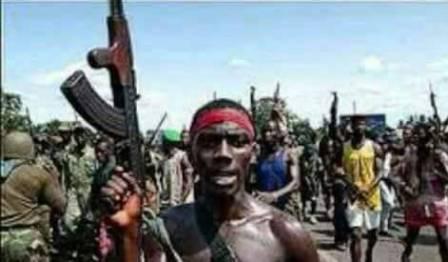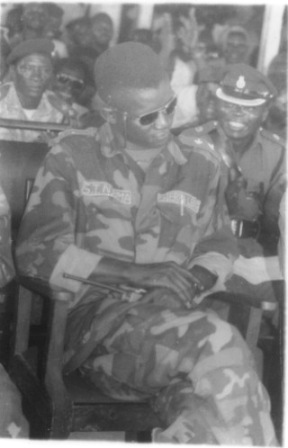The RUF atrocities in retrospect: Can we exonerate the NPRC from facing justice?
Nothing can be right and balanced again until justice is won – the injured party has to have justice. Do you understand that? Nothing can be right, for years, for lifetimes, until that first crime is punished. Or else we would all be animals. Exonerating the NPRC from facing justice is depriving justice to the aggrieved people families of the 29 murdered in cold blood because of their political belief and tribal affiliations. (Photo: Foday Sankoh, RUF leader)
The January 1999 mission was code-named “Spare No Living Thing”, and consisted of the murder, rape and mutilation of thousands of civilians. Other missions included “Operation Burn House” which was a series of arson attacks and “Operation Pay Yourself” which was a looting mission.
It is estimated that between 100,000 and 200,000 people (2-4% of the population) lost their lives during the war. An additional 100,000 or more were mutilated. Moreover, countless persons were displaced by the war. There is no single cause for the 11 year war in Sierra Leone, which began on March 23, 1991. The conflict started as a rebel incursion at Sierra Leone’s border with Liberia. The RUF claimed responsibility for the uprising, declaring it was fighting against the corrupt middle-class in the capital, Freetown. Additional contributing causes include corruption, monopolization of power, and unequal distribution of wealth. The prominent human rights group, Human Rights Watch stated, the deep-rooted issues that gave rise to the war [include] a culture of impunity, endemic corruption, and weak rule of law, crushing poverty, and the inequitable distribution of the country’s vast natural resources.
The leader of the RUF was an ex-Corporal in the Sierra Leone Army (“SLA”), Foday Sankoh. The goal of the RUF was to overthrow the All People’s Congress Party Government, headed by Major-General Joseph Saidu Momoh. While claiming they were liberating the people of Sierra Leone from Government corruption, the RUF began a reign of terror over them. No area of the country was spared. The rebels became notorious for hacking off limbs, predominantly of women and children. They conscripted children, often through coercion and drugs, to aid in the performance of atrocities. For instance, Musa Daboh was abducted when he was 13. The RUF made cuts in his leg and rubbed cocaine in before sending him into the front line. “Daboh says they were on drugs when they attacked the village [his home town Kabala], going on a firing spree, as humans ‘were like chickens.'”
Rape and murder were widespread. “They stripped me naked and raped me in front of my husband. They told him to laugh in front of the children or he would be shot,” [said Baindu] It didn’t matter. They shot him anyway, and their three children. There was mass destruction of property and forced labor. Sahr Gbamanja saw the RUF burn his 13-year-old brother to death in their house. “The rebels”, he said, “tied people together in gangs and forced them to work or carry food and ammunition. Those who refused or were too weak to work had their hands cut off or were butchered.” These are just a few examples. A United Nations supported forensic team has uncovered more than 75 mass graves, which are exhumed after the final mapping of the sites took place. Additional information regarding how the bodies were killed should be available after the bodies are exhumed. The exhumation uncovered atrocities that to date are unknown.
Articles 2 through 5 of the Statute outline the crimes that the Special Court has the jurisdiction to prosecute. These include: (i) Crimes against Humanity, (ii) Violations of Article 3 common to the Geneva Conventions of 12 August 1949 for the Protection of War Victims, and of Additional Protocol II thereto of June 8, 1977, (iii) Other serious violations of international humanitarian law, and (iv) Specific crimes under Sierra Leonean Law.
If the role of the Special Court in dealing with impunity and developing respect for the rule of law in Sierra Leone is to be fully understood, then prosecuting members of the NPRC who carried out extra judicial killings of 29 unarmed Sierra Leoneans without due process of law should be pursued by the government of Sierra Leone under its laws. This will send a message to Sierra Leoneans of all ages that the culture of impunity practiced by specific individuals will not be tolerated in Sierra Leone. The people of Sierra Leone need justice for the 29 people murdered in cold blood by the members of the NPRC and looting of state coffers that devastated their country. The most effective way for the people to reconcile with the past and start building a future is to see justice being done.
Written by Joseph S. Sherman, Editor-in-Chief, New Daily Nation
Stay with Sierra Express Media, for your trusted place in news!
© 2011, https:. All rights reserved.





